27 sept 2016
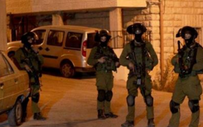
Israeli soldiers invaded, on Tuesday at dawn, the al-Arroub refugee camp, north of the southern West Bank city of Hebron, and kidnapped three Palestinians. The soldiers also demolished four water wells in Sa’ir town, north of Hebron.
The Hebron office of the Palestinian Prisoners Society (PPS) said the several army vehicles invaded the al-‘Arroub refugee camp, north of Hebron, searched many homes and kidnapped three Palestinians.
The PPS said the kidnapped have been identified as Odai Salama al-Jondi, Mohammad Nabil al-Qeeq and a college student, identified as Amro Amjad al-Haddoush.
The camp has been recently subject to nighty invasions, violent home searches and many abductions carried out by the Israeli army.
In addition, the soldiers invaded Sa’ir town, and demolished wells used by local farmers and shepherds for irrigation and for their livestock.
Local sources said this is the second time the soldiers demolish wells in the same area in nearly 45 days, as the army also demolished residential sheds and barns.
The demolished wells belong to Ziad Mahmoud Shalalda, Ahmad Mohammad Shalalda, Ibrahim Mohammad Shalalda and Nabil Abdul-Hadi Shalalda.
The Hebron office of the Palestinian Prisoners Society (PPS) said the several army vehicles invaded the al-‘Arroub refugee camp, north of Hebron, searched many homes and kidnapped three Palestinians.
The PPS said the kidnapped have been identified as Odai Salama al-Jondi, Mohammad Nabil al-Qeeq and a college student, identified as Amro Amjad al-Haddoush.
The camp has been recently subject to nighty invasions, violent home searches and many abductions carried out by the Israeli army.
In addition, the soldiers invaded Sa’ir town, and demolished wells used by local farmers and shepherds for irrigation and for their livestock.
Local sources said this is the second time the soldiers demolish wells in the same area in nearly 45 days, as the army also demolished residential sheds and barns.
The demolished wells belong to Ziad Mahmoud Shalalda, Ahmad Mohammad Shalalda, Ibrahim Mohammad Shalalda and Nabil Abdul-Hadi Shalalda.
26 sept 2016
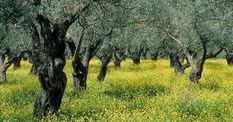
An Israeli army patrol stormed on Sunday a nature reserve in the southern occupied West Bank city of al-Khalil and its soldiers razed cultivated land lots.
Coordinator for the national anti-settlement committee in southern al-Khalil, Rateb al-Jabour, said the Israeli occupation army broke into the al-Daqiqa nature reserve in Yatta, removed barbed wire surrounding the area, and leveled vast land tracts covering an area of over 100 dunums.
According to al-Jabour, the Israeli forces threatened to devastate the reserve upon three earlier occasions on claims of surpassing the border fence.
He added that the nature reserve was built some eight years ago with the help of foreign charities and is planted with 5,000 unfruitful trees.
The reserve also includes eight wells for amassing rainwater. The Israeli occupation authorities and military forces have often razed Palestinian natural resources and nature reserves to the ground in an attempt to destabilize the ecological balance across the occupied Palestinian territories and force the locals to abandon their native lands.
Coordinator for the national anti-settlement committee in southern al-Khalil, Rateb al-Jabour, said the Israeli occupation army broke into the al-Daqiqa nature reserve in Yatta, removed barbed wire surrounding the area, and leveled vast land tracts covering an area of over 100 dunums.
According to al-Jabour, the Israeli forces threatened to devastate the reserve upon three earlier occasions on claims of surpassing the border fence.
He added that the nature reserve was built some eight years ago with the help of foreign charities and is planted with 5,000 unfruitful trees.
The reserve also includes eight wells for amassing rainwater. The Israeli occupation authorities and military forces have often razed Palestinian natural resources and nature reserves to the ground in an attempt to destabilize the ecological balance across the occupied Palestinian territories and force the locals to abandon their native lands.
9 sept 2016
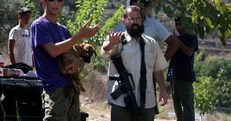
A group of Jewish settlers on Thursday entered under military protection an archaeological area north of al-Khalil city with the intention of taking it over.
Local activist Mohamed Awad told the Palestinian Information Center (PIC) that dozens of settlers escorted by officers from the Israeli army's civil administration and the Shin Bet stormed Khirbet Jala area, west of Beit Ummar town in al-Khalil, and combed the archaeological location with its wells and caves using maps and laptops.
Awad expressed fears of Israeli intents to build a settlement or carry out a Judaization project on the historical site, where there is an ancient Islamic shrine.
Local activist Mohamed Awad told the Palestinian Information Center (PIC) that dozens of settlers escorted by officers from the Israeli army's civil administration and the Shin Bet stormed Khirbet Jala area, west of Beit Ummar town in al-Khalil, and combed the archaeological location with its wells and caves using maps and laptops.
Awad expressed fears of Israeli intents to build a settlement or carry out a Judaization project on the historical site, where there is an ancient Islamic shrine.
7 sept 2016
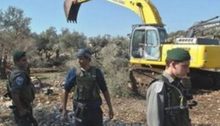
Israeli soldiers uprooted, Wednesday, more than 40 Dunams (9.88 Acres) of Palestinian agricultural lands, and two water wells, in Beit Ola town, west of Hebron, in the southern part of the occupied West Bank.
Issa al-‘Emla, the coordinator of the Popular Committee against the Wall and Colonies in Beit Ola, said the Israeli military bulldozers uprooted more than 40 of lands, belonging to Bassam Hamdan al-‘Adam, Suleiman Mohammad al-‘Adam and Ali al-‘Adam.
The lands were planted with more than 800 olive and almond trees, while the soldiers also destroyed two wells, used for collecting rainwater close to the Annexation Wall, and that the army claimed the lands were “owned by the state.”
Al-‘Emla stated that the attack was carried out although there are a number of cases that are still under deliberation by Israeli courts, and no final ruling has been issued yet.
He added that Israel is targeting the Palestinian lands in the area in order to control them for military purposes, and for the construction and expansion of its illegal colonies.
Israel has uprooted hundreds of Dunams of Palestinian lands in the same area, over the last several years, in addition to demolishing many wells and destroying the electricity networks.
Issa al-‘Emla, the coordinator of the Popular Committee against the Wall and Colonies in Beit Ola, said the Israeli military bulldozers uprooted more than 40 of lands, belonging to Bassam Hamdan al-‘Adam, Suleiman Mohammad al-‘Adam and Ali al-‘Adam.
The lands were planted with more than 800 olive and almond trees, while the soldiers also destroyed two wells, used for collecting rainwater close to the Annexation Wall, and that the army claimed the lands were “owned by the state.”
Al-‘Emla stated that the attack was carried out although there are a number of cases that are still under deliberation by Israeli courts, and no final ruling has been issued yet.
He added that Israel is targeting the Palestinian lands in the area in order to control them for military purposes, and for the construction and expansion of its illegal colonies.
Israel has uprooted hundreds of Dunams of Palestinian lands in the same area, over the last several years, in addition to demolishing many wells and destroying the electricity networks.
20 aug 2016
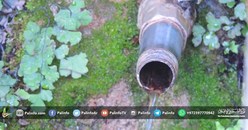
Jewish settlers from Ariel settlement have recently drilled an artesian well on an annexed plot of land belonging to the famers of Salfit, north of the West Bank, according to local eyewitnesses.
The well was built in Khirbet al-Shajarah area, which is located between Ariel settlement and the segregation wall.
Local researcher Khaled Maali said that the Israeli occupation authority (IOA) had drilled several artesian wells in Salfit province and different West Bank areas lately, while banning the Palestinian natives from drilling for water.
Maali added that Ariel settlers also built a huge retention basin in the area to contain large amounts of water.
He affirmed that the IOA controls water resources in the West Bank and provide its settlements with ceaseless water supplies while deliberately depriving the Palestinians in certain areas of Salfit, Jenin and Nablus of their water needs.
The well was built in Khirbet al-Shajarah area, which is located between Ariel settlement and the segregation wall.
Local researcher Khaled Maali said that the Israeli occupation authority (IOA) had drilled several artesian wells in Salfit province and different West Bank areas lately, while banning the Palestinian natives from drilling for water.
Maali added that Ariel settlers also built a huge retention basin in the area to contain large amounts of water.
He affirmed that the IOA controls water resources in the West Bank and provide its settlements with ceaseless water supplies while deliberately depriving the Palestinians in certain areas of Salfit, Jenin and Nablus of their water needs.
19 aug 2016
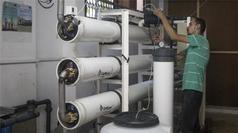
Water crisis in the besieged Palestinian territory is putting Palestinian lives at risk, analysts say.
Water may be a highly valued commodity the world over - but in al-Shati refugee camp north of Gaza City, it is like gold.Along this small stretch of the Mediterranean coast, all it takes to work that out is turning on a tap: When it is there at all, the water is salty, or sometimes cloudy.
Nahed Radwan, who lives with her eight children and extended family in a pastel-painted house by the sea road, said her family normally gets water once a week for two days.
"The water we have, when it's on, it's not clean; it's undrinkable. It hurts the eyes because of the high salinity," Radwan, 34, told Al Jazeera.
READ MORE: Water crisis deepens in the Gaza Strip
Only an estimated 3 percent of Gaza's water is suitable for drinking. The Palestinian Water Authority and the United Nations have warned that its underground water aquifer - upon which the territory is almost entirely reliant, apart from a small amount of water imported from Israel - may be completely contaminated by the end of the year. Gaza's water contains a large concentration of chloride, while infiltration of untreated sewage has raised the levels of nitrates to two to eight times higher than the World Health Organization recommends.
Gaza is also gripped by an electricity crisis that sometimes leaves households with just a few hours of power a day.
"People are using generators for water, but we can't afford it," Radwan said. "Especially my girls - they don't like to take showers with salty water, their hair starts to fall out. I cook and do everything with drinking water."
The water we have, when it's on, it's not clean; it's undrinkable. It hurts the eyes because of the high salinity.
Nahed Radwan, Gaza resident
Many Palestinians in Gaza buy water from small-scale desalination plants, which filter the contaminated aquifer water. Private vendors distribute the water to residents using trucks. But by the time the water reaches household tanks, it is expensive - up to five times the price of water from the municipal network - and often not safe to drink. Fewer than half of Gaza's desalination facilities are licensed, according to Oxfam.
International NGOs working in the water sector in Gaza have found that 68 percent of the water that reaches households from these plants becomes biologically contaminated during storage or transportation, yet 85 percent of Palestinians in Gaza depend on this water for drinking and cooking.
EWASH, a coalition of Palestinian and international organisations working in the water and sanitation sector, says that low-income households in Gaza spend at least six times more of their income on water than their counterparts in the United Kingdom.
The recent Turkey-Israel deal is expected to provide some relief, allowing Turkey to work on a number of infrastructure projects in Gaza, including a power station and a desalination plant. Ribhi al-Sheikh, deputy head of the Palestinian Water Authority, told Al Jazeera he did not yet have details of the project.
At least 70 percent of the materials needed to build and maintain Gaza's water and sanitation network - including pumps and chemicals for water purification - are subject to severe entry restrictions amid Israel's siege on Gaza, according to EWASH. The lack of proper infrastructure has contributed to pollution: Every 38 minutes, the coalition found, the equivalent of one Olympic swimming pool of raw or partially treated sewage is discharged into the sea in Gaza.
Over-extraction from Gaza's aquifer at twice the sustainable rate has led to the infiltration of seawater, contributing to the degradation of water quality. Unregulated wells - which Palestinians in Gaza have been digging, both for agricultural and household use - have compounded the problem of over-extraction.
"The scarcity of water [in Gaza] is the problem or the crisis of the time," Najma Fares, a researcher at al-Azhar University's Water and Environment Institute, told Al Jazeera. "Because of the abuse or extraction of this water, in the next years Gaza will face a big problem that could endanger the lives of Gazans. It will be an environmental catastrophe."Fares, who worked on a pilot project to treat waste water from a factory in central Gaza for immediate reuse in agriculture, said the implementation of such a scheme would need considerable funding.
Some funding for this sector has come from international donors, including the European Union, which invested $11m in a new seawater desalination plant in Gaza that was inaugurated in June. Over the next three years, a second phase of the project aims to double its capacity, allowing the plant to serve an estimated 150,000 people in southern Gaza.
Critics, however, say such efforts do not go far enough.
"The problem is not in securing the funds or the grant for implementing these desalination projects. The problem comes afterwards. Who will operate it; who will pay the bill for this?" said Mahmoud Shatat, the programme manager for Oxfam's Water, Sanitation and Hygiene Promotion programme. "How can we afford the electricity and the fuel? Solar energy only covers a small amount of what's needed to run a desalination plant."
READ MORE: Gaza electricity crisis - 'People are dying daily'
Small-scale seawater desalination plants have high operating costs, and are meant to be a mid-term solution. The Palestinian Water Authority said a large-scale plant able to serve all of Gaza should be operational by 2020 - but while Gulf countries and France have pledged funding towards its estimated cost of $330m, more is required.
Marwan Albardawil, the authority's head of water and waste water projects, said a variety of options to tackle Gaza's water crisis have been studied over the years. "Among these, there was importing water from Egypt, Turkey and Israel; delivering water from the West Bank to the Gaza Strip; and seawater desalination. The proper option was desalination," Albardawil told Al Jazeera.
A study [PDF] conducted in 2011 as part of the Gaza Emergency Technical Assistance Programme recommended the transfer of high volumes of water from Israel, in order to give Gaza an equitable share of regional water resources. However, water-sharing arrangements are supposed to be part of the long-awaited final status peace negotiations.
Clemens Messerschmid, a geologist who has worked in the Palestinian water sector for 20 years, said the source of Gaza's water problem is its large population, which has skyrocketed to more than 1.8 million. A simple solution would be for Gaza to buy water from Israel, which has a surplus in the south, he said.
"The whole Strip has actually the density of a city ... Gaza is a city, but a special city that is sealed off. No city on the planet can survive from within its own parameters," Messerschmid said, noting he does not believe seawater desalination is a good solution from an environmental perspective.
"If we talk about the environment seriously, we talk about climate change," he added. "To say our solution for humankind in the future is to burn fossil fuel in order to create the most mobile element on earth, water, it's simple madness. We wouldn't suggest that anywhere else."
Water may be a highly valued commodity the world over - but in al-Shati refugee camp north of Gaza City, it is like gold.Along this small stretch of the Mediterranean coast, all it takes to work that out is turning on a tap: When it is there at all, the water is salty, or sometimes cloudy.
Nahed Radwan, who lives with her eight children and extended family in a pastel-painted house by the sea road, said her family normally gets water once a week for two days.
"The water we have, when it's on, it's not clean; it's undrinkable. It hurts the eyes because of the high salinity," Radwan, 34, told Al Jazeera.
READ MORE: Water crisis deepens in the Gaza Strip
Only an estimated 3 percent of Gaza's water is suitable for drinking. The Palestinian Water Authority and the United Nations have warned that its underground water aquifer - upon which the territory is almost entirely reliant, apart from a small amount of water imported from Israel - may be completely contaminated by the end of the year. Gaza's water contains a large concentration of chloride, while infiltration of untreated sewage has raised the levels of nitrates to two to eight times higher than the World Health Organization recommends.
Gaza is also gripped by an electricity crisis that sometimes leaves households with just a few hours of power a day.
"People are using generators for water, but we can't afford it," Radwan said. "Especially my girls - they don't like to take showers with salty water, their hair starts to fall out. I cook and do everything with drinking water."
The water we have, when it's on, it's not clean; it's undrinkable. It hurts the eyes because of the high salinity.
Nahed Radwan, Gaza resident
Many Palestinians in Gaza buy water from small-scale desalination plants, which filter the contaminated aquifer water. Private vendors distribute the water to residents using trucks. But by the time the water reaches household tanks, it is expensive - up to five times the price of water from the municipal network - and often not safe to drink. Fewer than half of Gaza's desalination facilities are licensed, according to Oxfam.
International NGOs working in the water sector in Gaza have found that 68 percent of the water that reaches households from these plants becomes biologically contaminated during storage or transportation, yet 85 percent of Palestinians in Gaza depend on this water for drinking and cooking.
EWASH, a coalition of Palestinian and international organisations working in the water and sanitation sector, says that low-income households in Gaza spend at least six times more of their income on water than their counterparts in the United Kingdom.
The recent Turkey-Israel deal is expected to provide some relief, allowing Turkey to work on a number of infrastructure projects in Gaza, including a power station and a desalination plant. Ribhi al-Sheikh, deputy head of the Palestinian Water Authority, told Al Jazeera he did not yet have details of the project.
At least 70 percent of the materials needed to build and maintain Gaza's water and sanitation network - including pumps and chemicals for water purification - are subject to severe entry restrictions amid Israel's siege on Gaza, according to EWASH. The lack of proper infrastructure has contributed to pollution: Every 38 minutes, the coalition found, the equivalent of one Olympic swimming pool of raw or partially treated sewage is discharged into the sea in Gaza.
Over-extraction from Gaza's aquifer at twice the sustainable rate has led to the infiltration of seawater, contributing to the degradation of water quality. Unregulated wells - which Palestinians in Gaza have been digging, both for agricultural and household use - have compounded the problem of over-extraction.
"The scarcity of water [in Gaza] is the problem or the crisis of the time," Najma Fares, a researcher at al-Azhar University's Water and Environment Institute, told Al Jazeera. "Because of the abuse or extraction of this water, in the next years Gaza will face a big problem that could endanger the lives of Gazans. It will be an environmental catastrophe."Fares, who worked on a pilot project to treat waste water from a factory in central Gaza for immediate reuse in agriculture, said the implementation of such a scheme would need considerable funding.
Some funding for this sector has come from international donors, including the European Union, which invested $11m in a new seawater desalination plant in Gaza that was inaugurated in June. Over the next three years, a second phase of the project aims to double its capacity, allowing the plant to serve an estimated 150,000 people in southern Gaza.
Critics, however, say such efforts do not go far enough.
"The problem is not in securing the funds or the grant for implementing these desalination projects. The problem comes afterwards. Who will operate it; who will pay the bill for this?" said Mahmoud Shatat, the programme manager for Oxfam's Water, Sanitation and Hygiene Promotion programme. "How can we afford the electricity and the fuel? Solar energy only covers a small amount of what's needed to run a desalination plant."
READ MORE: Gaza electricity crisis - 'People are dying daily'
Small-scale seawater desalination plants have high operating costs, and are meant to be a mid-term solution. The Palestinian Water Authority said a large-scale plant able to serve all of Gaza should be operational by 2020 - but while Gulf countries and France have pledged funding towards its estimated cost of $330m, more is required.
Marwan Albardawil, the authority's head of water and waste water projects, said a variety of options to tackle Gaza's water crisis have been studied over the years. "Among these, there was importing water from Egypt, Turkey and Israel; delivering water from the West Bank to the Gaza Strip; and seawater desalination. The proper option was desalination," Albardawil told Al Jazeera.
A study [PDF] conducted in 2011 as part of the Gaza Emergency Technical Assistance Programme recommended the transfer of high volumes of water from Israel, in order to give Gaza an equitable share of regional water resources. However, water-sharing arrangements are supposed to be part of the long-awaited final status peace negotiations.
Clemens Messerschmid, a geologist who has worked in the Palestinian water sector for 20 years, said the source of Gaza's water problem is its large population, which has skyrocketed to more than 1.8 million. A simple solution would be for Gaza to buy water from Israel, which has a surplus in the south, he said.
"The whole Strip has actually the density of a city ... Gaza is a city, but a special city that is sealed off. No city on the planet can survive from within its own parameters," Messerschmid said, noting he does not believe seawater desalination is a good solution from an environmental perspective.
"If we talk about the environment seriously, we talk about climate change," he added. "To say our solution for humankind in the future is to burn fossil fuel in order to create the most mobile element on earth, water, it's simple madness. We wouldn't suggest that anywhere else."
18 aug 2016
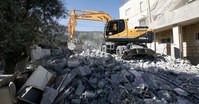
The Israeli occupation army on Wednesday evening notified a Palestinian citizen of its intention to demolish a water well in Yatta town, south of al-Khalil city.
Local activist Rateb al-Jabour said the well is located in Umm Neir south of the town and belongs to Mohamed al-Jabour.
This is the second and final demolition notice against the well, according to Jabour.
In another context, Israeli minister of construction Yoav Galant has declared Israel's intention to increase the number of settlers in Gush Etzion settlement bloc, north of al-Khalil, to half a million.
Galant made remarks in this regard during a visit on Tuesday to Gush Etzion, according to Jerusalem Post newspaper. "We have an obligation to build in Gush Etzion. This place is important historically and strategically," he told reporters.
Local activist Rateb al-Jabour said the well is located in Umm Neir south of the town and belongs to Mohamed al-Jabour.
This is the second and final demolition notice against the well, according to Jabour.
In another context, Israeli minister of construction Yoav Galant has declared Israel's intention to increase the number of settlers in Gush Etzion settlement bloc, north of al-Khalil, to half a million.
Galant made remarks in this regard during a visit on Tuesday to Gush Etzion, according to Jerusalem Post newspaper. "We have an obligation to build in Gush Etzion. This place is important historically and strategically," he told reporters.
17 aug 2016
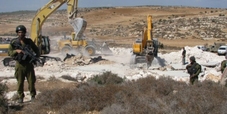
Israeli army bulldozers, on Wednesday morning, have reportedly leveled Palestinian-owned lands to the south of Hebron province.
A local journalist in Hebron said, according to the PNN, that the Israeli army destroyed a water tank and bulldozed Palestinian lands covering an area of 15 dunams in the western town of Beit Oula, in the southern occupied West Bank.
Over 300 olive trees were planted in the targeted tract. Owned by Palestinian citizen Muhammad al-Amla, the lands, located near the Israeli apartheid wall, were reportedly razed without prior notification.
Army troops went on to chase down Palestinian protesters in the area.
A local journalist in Hebron said, according to the PNN, that the Israeli army destroyed a water tank and bulldozed Palestinian lands covering an area of 15 dunams in the western town of Beit Oula, in the southern occupied West Bank.
Over 300 olive trees were planted in the targeted tract. Owned by Palestinian citizen Muhammad al-Amla, the lands, located near the Israeli apartheid wall, were reportedly razed without prior notification.
Army troops went on to chase down Palestinian protesters in the area.
